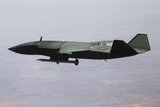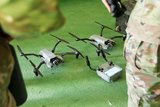Airborne C-UAS laser proves its worth in early tests, say Israelis
This high-power laser, installed on a Cessna aircraft, was used in Israel defeat to multiple undisclosed types of UAVs in various scenarios. (Photo: Elbit Systems)
The Israeli MoD and Elbit Systems last week performed the first successful tests of an airborne laser to intercept UAVs.
Once matured, this capability would complement the extensive array of missile interception systems — such as Arrow, David’s Sling and Iron Dome — that are available to the IDF.
Rafael Advanced Defense Systems in February 2020 demonstrated the hard-kill C-UAS capability of its ground-based Drone Dome system, using a laser beam director — but the MoD and Elbit claim to have broken new ground in testing an airborne laser.
The high-power laser was carried by a Cessna light aircraft and
Already have an account? Log in
Want to keep reading this article?
More from Air Warfare
-
![Singapore Airshow 2026: CCA manufacturers eye growing opportunities in Asia-Pacific]()
Singapore Airshow 2026: CCA manufacturers eye growing opportunities in Asia-Pacific
Companies offering collaborative combat aircraft say there is a massive potential for countries adopting the capability in the Asia-Pacific region.
-
![Singapore Airshow 2026: Airbus-RSAF H225M teaming tests point to future scalability]()
Singapore Airshow 2026: Airbus-RSAF H225M teaming tests point to future scalability
The tests between a Republic of Singapore Air Force H225M and Airbus Flexrotor uncrewed aerial system were designed to allow the crew to receive and process real-time data from the UAS while maintaining direct command and control.
-
![Singapore Airshow 2026: Saab eyes “share” in future fighter market, targets 2027 CCA demo flight]()
Singapore Airshow 2026: Saab eyes “share” in future fighter market, targets 2027 CCA demo flight
The Swedish government is expected to make a decision on the next steps of the Future Fighter System Concept programme by 2030, with the current second phase focusing on technology knowledge expansion and demonstration flights.
-
![Singapore Airshow: Red Cat ramps up portfolio development amid “key” APAC opportunities]()
Singapore Airshow: Red Cat ramps up portfolio development amid “key” APAC opportunities
In the wake of its 1,842% year-on-year revenue increase in Q4 2025, Red Cat sees mass opportunities in the Asia-Pacific region as the company eyes an ongoing production increase and market growth.






















